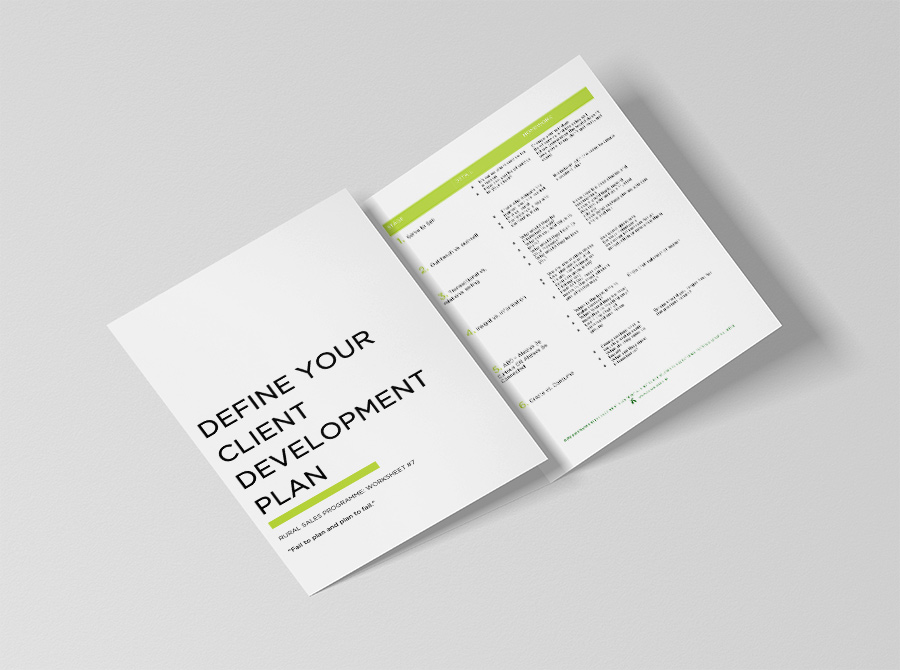Do You Focus On Sales Experience Or Customer Experience?
The Sale Experience is often over-shadowed by its cooler cousin Customer Experience (CX). This is because anything to do with “sales” has always been seen as a business that is below most marketers.
Yet the Sale Experience is the primary impression you customer will get of your rural business so you need to make it count. And without a sale no one gets paid.
Everyone knows you don’t get a customer until you make a sale and if don’t get your Sales Experience right there’s no chance of a Customer Experience.
The Sale Comes Before The Customer
Most Sales Experiences we see in rural markets are messy, unprofessional and unplanned. The result is a rather piss poor performance – and that’s the polite term.
The cost of not getting your Sales Experience right costs rural businesses literally thousands or millions of dollars in missed sales.
We’ve seen it happen many times with our own eyes where we sit in and observe a sale that was a sitter, there for the taking but was butchered and bungled because the rural sales rep hadn’t properly prepared or planned a professional Sales Experience.
This poor performance can come in many forms:
- the rural rep didn’t ask the right questions to understand buyer motives
- they turned up late without confirming and re-confirming the appointment beforehand
- they didn’t little in the way of homework and intel before the meeting
- they provided little in the way of a unique or differentiated offering that they could leave the prospect with turn over in their own mind
- they weren’t ready for the predictable objections the prospect would always ask
- they didn’t probe for the prospect’s pain points using the appropriate qualifying questions
- they left without any agreement or appointment for the next step in the sales cycle.
Any sales performance, like any athletic performance, can be greatly improved when your sales team properly plan and prepare.
Surgeons, high performance sports teams, doctors or pilots don’t “wing it” and nor should you if you want to be respected, successful and highly-paid rural sales professional.
So what constitutes a great Sales Experience?
I think it comes down to three things:
- Giving the customer some unique insight or intelligence that they wouldn’t be able to work out for themselves that demonstrates immediate value from the get go
- Getting the customer to think and consider a different point of view or perspective that reframes the problem they assume or think they have (and points out the danger of self-diagnosis and how their bias is blinding them)
- Breaking their automatic “here we go again with another sales meeting” guessing machine
Turning up and telling them something they already know won’t get you the sale.
You’re just saying the things your competitors can tell them too.
You have to come armed with a unique piercing insight, something that gets them thinking or teaches them something that they place great value on.
Maybe it’s losing money when they are thinking they’re making money. Maybe it’s risking staff morale over savings. Or maybe it’s poor profitability because of poor pricing.
You need to ask the hard, super-searching questions that challenge client’s baked-in assumptions and over-confidence biases such as:
“How have do you ensure you have an accurate handle on the way customers think and feel about you right now? If we asked them now what words would you think they’d use? How do you know this to be true? What evidence or data do you have to support that claim?”
“How are you accurately measuring the efficacy of your current marketing spend so your budget is spent in the most efficient and effective manner? How do you determine which dollars are well spent and which aren’t? Can you take me through the metrics you use?”
“Do you know how much a customer is worth in lifetime value to you so you can confidently know what you can afford to spend acquiring them? What is your current CPA and LTV for an average customer?”
“In what ways is your website delivering qualified leads and building your list to put upward pressure on pricing for your product/service/offer?”
“Which metrics do you measure most to know you are on the way to securing more sales in the long run? What leading sales indicators do you use so you don’t get a nasty end of month/quarter surprise?”
“How do you ensure your sales training is recalled and remembered within your team? How do you test that they have retained their training? Which methods do you use to achieve this?”
“How do you define your current sales process to ensure your sales team follow that sales process with discipline and accuracy? How do you hold your sales accountable when they don’t adhere? How do you show the impact and implications of non-adherence?”
“How do you stress-test the quality of the prospects in your current sales pipeline? Or do you rely on sales rep self-reporting?”
You get the idea.
The questions you ask are deep, searching ones that get your customer thinking.
You ask questions others don’t.
You have to challenge and jolt their existing paradigms to create buyer tension using compelling data, evidence, stories or case studies to support your argument with the right rationale vs rhetoric.
Make sure you point out their lack of logic (this is key in all objection handling/prevention scenarios).
The cognitive dissonance you create with your powerful questions means they will attach more meaning and value to what you have to offer over others because you have got them to see their problems in a different light.
You’ve managed to move them in their minds which taps into their true or new motivations.
And when you move them in that way (which people call ‘adding value’) they are much more likely to make and take action with you vs. your competitor.
The best way I can put this simply is: you need to serve to sell.
Your serve your prospect as soon as you start to sell. You start the terms of the relationship from the get go so they know you are of service.
You convey a sincere duty of care and a genuine desire to help them solve their problems in a unique and effective way by taking the time to work out what their true needs are and what’s getting in the way of them getting the results they want.
All rural sales professionals are judged by the quality of your questions you ask and the preparation you have done that shows them you know their business.
How you structure your sales conversation is what will differentiate from the rest of the pack.
Be sure that you plan and prepare properly for that sale conversation by structuring it in the right manner by mapping out your Sale Experience.
That’s what makes a great Sales Experience and that’s what will get you a customer quicker and faster than any competitor.





